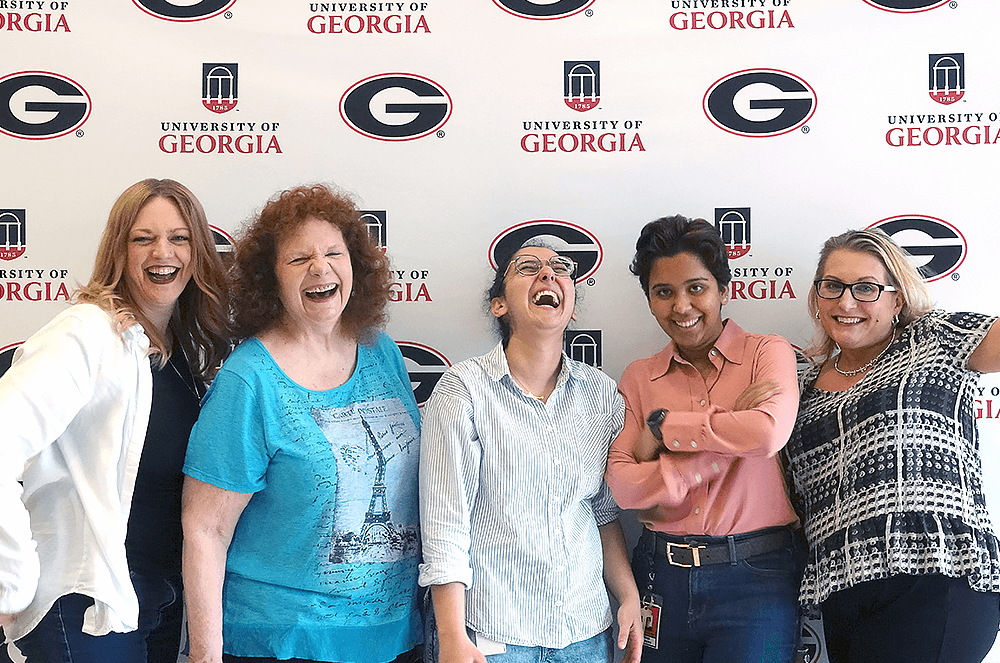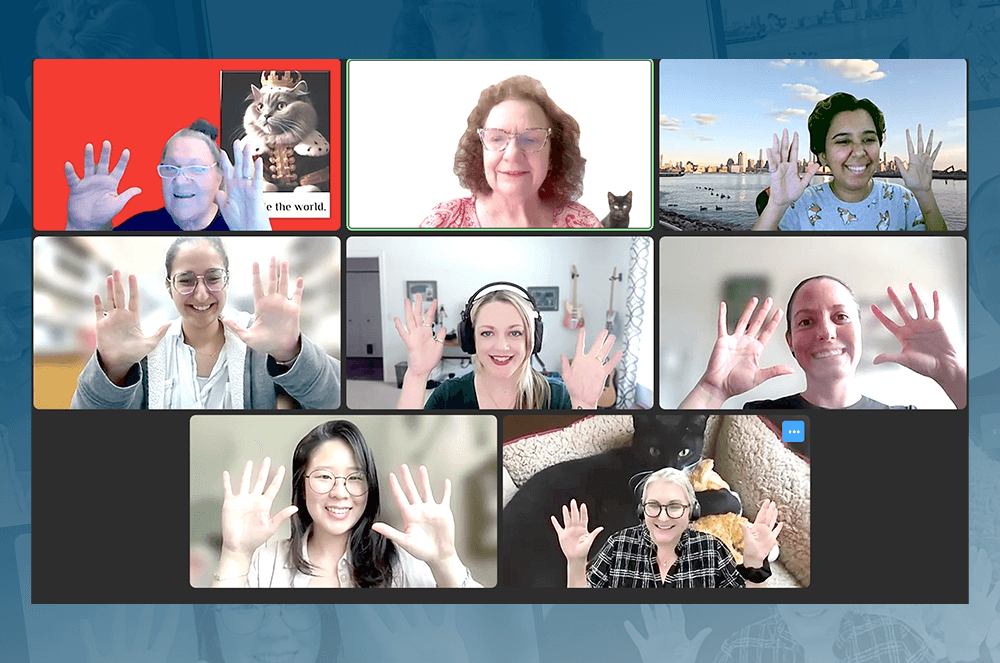
The Word of the Day was “diversity.” Throughout a recent meeting of the UGA (University of Georgia) Griffin Campus Toastmasters club, speaker after speaker used it correctly in their comments. Their usage didn’t just earn a brief mention in the grammarian’s report but was actively celebrated by the entire club with jazz hands, every member waggling their open palms like a Broadway chorus.
“Jazz hands is something we came up with to highlight someone using the Word of the Day,” explains Revati Narwankar, Vice President Membership for the hybrid club, based near Atlanta. “It assigns a visual element to the Word of the Day and automatically makes your brain want to use it more, or retain the contextual information as to why and how you use the word. It’s a very good way to get members involved.”
Jazz hands is one of the language tools used by UGA Griffin, a bilingual club, which expanded the grammarian’s role during meetings to help its members better understand the English language and use it with confidence. Most remarkable of all, UGA Griffin has made it fun to talk about grammar.
Everyone’s a Grammarian
Many of the club’s members attend the University of Georgia, although membership is open to all. A high proportion of the UGA Griffin population are international students who are non-native English speakers. They joined Toastmasters to improve their language skills but were hesitant to speak up, especially when each meeting had someone assigned to point out grammatical errors (no matter how kindly expressed). But then one did speak up.
“One of our members, Mayra Villar-Buzo, who is from Mexico, came to us and said, ‘I struggle with English and I sometimes feel like it’s a prohibitive factor for me to talk to people or to introduce certain things, because I’m always under this pressure that if I make a mistake, I’m going to be laughed at or not be taken seriously,’” explains Jouman Hassan, the Club President.
It was a common experience for many members, including Hassan, who is from Lebanon. “Words or phrases were said throughout the meeting that we didn’t understand, and we would just nod along like we did,” she recalls. But that changed after Villar-Buzo expressed her feelings. The club’s members and Executive Committee discussed how they could expand the grammarian role to be more helpful to non-native speakers and to approach it in a relaxed, friendly way.
Click play to hear the hosts of The Toastmasters Podcast speak with experienced translator and Toastmaster Gwenydd Jones. In this episode, she shares tips on how to make the most out of attending bilingual meetings.
“We decided to make everyone a grammarian so we can all actively listen to the words and phrases,” Hassan says. In other words, every member is encouraged to assist the designated grammarian on this aspect of the meeting.
Helping non-native speakers feel comfortable also means showing empathy.
“The advice I would give is to just be supportive and be kind, because when you’re correcting someone’s English, it’s a very sensitive topic to all of us,” Hassan notes. “No one wants to be corrected on the way they’re pronouncing a word or the grammar mistakes they’re making.”
Jouman HassanThe club made changes incrementally, starting with the Word of the Day. At UGA Griffin, the grammarian gives a lot of attention to the selected word. They start by explaining its meaning with a formal definition and using it in a sentence. Members are encouraged to use it correctly—emphasis on “correctly”—throughout the meeting. The grammarian tries to choose a word that’s relevant to the meeting theme, to make it easier for members to use it.
Debbie Thompson, Vice President Education, says the word is usually heard multiple times throughout the meeting, and the resulting jazz hands serve as a positive reinforcement while also making everyone a more active listener.
With all those jazz hands, who wouldn’t look for ways to say the day’s word or listen more closely for the chance to have a little fun?
Solving Language Mysteries
Besides the Word of the Day, grammarians watch out for idioms, colorful phrases that are often a mystery to speakers of other languages—like “beating around the bush” and “sink your teeth into this.” UGA Griffin members make sure idiomatic expressions are explained so everyone understands them and can get comfortable hearing them outside the meetings. Members often call on the expertise of Vice President Public Relations Jennifer Reynolds, an English literature student.
To reinforce words and idioms they’ve introduced, the club keeps track of the idioms and Words of the Day used in their meetings and sends a list to members every two months to refresh their knowledge.
The club uses several other tactics to help members reach language learning goals. A member who uses the Word of the Day at least once in a meeting is named a Grammar Legend, which counts toward being honored as Toastmaster of the Month.
The club emphasizes the English language but doesn’t forget members’ international roots. For example, at some meetings, members bring desserts from their home countries. Hassan recently presented “Lebanon 101,” a fact-filled speech about her homeland, and Vice President Membership Narwankar will offer a look at India, where she was born, at an upcoming meeting. Similar presentations are planned by members from Spain, Mexico, and the United States.

A Safe Place to Make Mistakes
The club’s grammar strategies are critical in supporting the universal Toastmasters mission of creating a safe place where members are free to make mistakes without fear of embarrassment.
“International students tend to use simpler words, and our sentences become very simple or very short, just so we prevent ourselves from making mistakes while talking,” Hassan says. “But with more emphasis on the grammarian role, we show members that it’s okay to make a mistake. And if a mistake is made, it’s addressed in a very supportive and a safe environment.”
“We highlight the mistake,” she notes, “and we give our recommendations on how to fix it for next time or how to stop making the mistake.”
The club’s “everyone’s a grammarian” approach also supports the less experienced members appointed to the role. If a newer English speaker misses an error, other members can step in and offer their feedback.
The results of these strategies have been clear. Members’ increased confidence is evident in their active participation, both in speaking and when contributing to the Zoom chat if they’re attending remotely, club leaders say.
Advice for All
English grammar is a challenge for many, even to those who have been raised with the language, which is why UGA Griffin’s methods for the grammarian role can be instructive. “Listen to what your members want,” Hassan says. “We would have been none the wiser about this if Mayra hadn’t spoken up. Have a check-in with your members: ‘What do you expect or what do you want to get out of this club?’”
She urges Toastmasters to “be very kind and very conscientious. That’s why our members are becoming more comfortable—because they feel this environment is a safe place for them to make mistakes.”
Kate McClare, DTM , is a professional writer and editor who joined Toastmasters in 2011. She is a member of Miami Advanced Toastmasters Club in Kendall, Florida, and an Area Director for District 47, Southeast Florida and The Bahamas.



 Previous
Previous

 Previous Article
Previous Article

